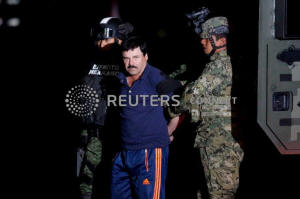U.S. judge expected to put Mexican drug lord 'El Chapo' behind bars for
life
 Send a link to a friend
Send a link to a friend
 [July 17, 2019]
By Brendan Pierson [July 17, 2019]
By Brendan Pierson
NEW YORK (Reuters) - Joaquin "El Chapo"
Guzman, the Mexican drug lord found guilty of running a murderous
criminal enterprise that smuggled tons of drugs into the United States,
is scheduled to be sentenced by a U.S. judge on Wednesday in what is
likely one of the last chapters in a decades-long career.
The sentencing hearing in a federal court in Brooklyn is expected to
feature a statement from someone who survived a murder plot led by
Guzman, prosecutors have said. The person's name has not been made
public.
Guzman, 62, was found guilty by a jury in February of trafficking tons
of cocaine, heroin and marijuana and engaging in multiple murder
conspiracies as a top leader of the Sinaloa Cartel, long known as one of
Mexico's largest and most violent drug trafficking organizations.
Prosecutors have asked U.S. District Judge Brian Cogan to sentence him
to life in prison, plus 30 years for use of firearms. Guzman's lawyers
have not disputed that a life sentence is mandatory.

Guzman, whose nickname means "Shorty," developed a reputation as a Robin
Hood-like figure that made him a folk hero to many in his home state of
Sinaloa, where he was born in a poor mountain village.
He is being held in solitary confinement in the Metropolitan
Correctional Center, a fortress-like jail in lower Manhattan. Cogan last
month rejected his request for more time to exercise on the jail's roof,
after prosecutors said that would risk an escape.
Before he was finally captured in 2016, Guzman twice escaped
maximum-security prisons in Mexico. He was extradited to the United
States to face trial in January 2017.
Guzman made a name for himself as a trafficker in the 1980s by digging
tunnels under the U.S.-Mexico border that allowed him to smuggle drugs
more quickly than any of his rivals. He amassed power during the 1990s
and 2000s through often bloody wars with rivals, eventually becoming the
best-known leader of the Sinaloa Cartel.
His 11-week trial, which featured testimony from more than a dozen
former associates of Guzman who had made deals to cooperate with
prosecutors, offered the public an unprecedented look at the cartel's
inner workings.
The witnesses, who included some of Guzman's top lieutenants, a
communications engineer and a onetime mistress, described how he built a
sophisticated organization reminiscent of a multinational corporation.
[to top of second column]
|

Joaquin "El Chapo" Guzman is escorted by soldiers during a
presentation in Mexico City, January 8, 2016. REUTERS/Tomas Bravo

He sent drugs northward with fleets of planes and boats, and had
detailed accounting ledgers and an encrypted electronic
communication system run through secret computer servers in Canada,
witnesses said.
U.S. prosecutors have claimed that Guzman sold more than $12 billion
worth of drugs, and Forbes magazine once listed him as among the
world's richest men.
Though other top cartel figures had been extradited to the United
States before, Guzman was the first to go to trial rather than
pleading guilty.
Guzman often lived on the run. Imprisoned in Mexico in 1993, he
escaped in 2001 hidden in a laundry cart and spent the following
years moving from one hideout to another in the mountains of
Sinaloa, guarded by a private army.
He was seized again in 2014, but pulled off his best known escape
the following year when he disappeared into a ventilated, mile-long
tunnel dug into his cell in a maximum-security prison.
He was finally recaptured in January 2016. The Mexican government
says he blew his cover through a series of slipups, including an
attempt to make a movie about his life.
Guzman's lawyers have said they intend to appeal his guilty verdict.
They have already asked Cogan to overturn it, citing a report that
jurors disobeyed court rules by reading news reports about the case
during the trial, but the judge rejected that request.
Despite Guzman's downfall, the Sinaloa Cartel had the biggest U.S.
distribution presence of Mexican cartels as of last year, followed
by the fast-growing Jalisco New Generation Cartel, according to the
U.S. Drug Enforcement Administration.

(Reporting by Brendan Pierson in New York; editing by Jonathan
Oatis)
[© 2019 Thomson Reuters. All rights
reserved.]
Copyright 2019 Reuters. All rights reserved. This material may not be published,
broadcast, rewritten or redistributed.
Thompson Reuters is solely responsible for this content. |